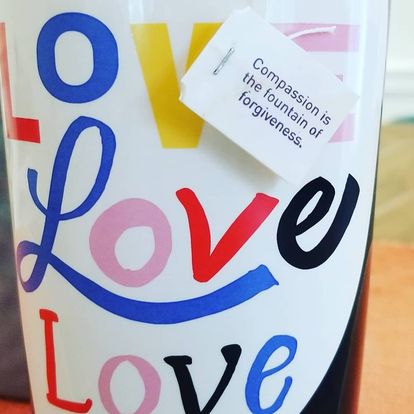THIS. IS. BIG! In the final episode of Season 1 of Shifting Our Shit, Rob hands over the reins of the S.O.S. Podcast to Megan. They wrap up the past year (and 28 episodes!) and talk about what they have learned and what they appreciate about each other. Megan has much gratitude for Rob as he was integral in helping get this podcast launched. It is with both sadness and joy that we launch Rob off to focus his attention on other things. We will still hear from him from time to time, just not every episode. Stay tuned for Season Two coming any day now as we “Meet the Team” at The Mindfulness Center. Hear why therapists decide to become therapists (messed up childhoods, no doubt! lol j/k) and therapists’ own experience with therapy!
Transition can be bittersweet.
Transition can be bittersweet. This is a sentiment that many of us can relate to, especially in times of change and uncertainty. The SOS Podcast recently aired its final episode of the season, marking a transition for the show. Megan and Rob discussed their plans for the future, the emotions of both excitement and sadness were palpable. This is a common experience for anyone who has gone through a significant life change, whether it be graduating from school, starting a new job, or moving to a new city.
Megan and Rob likened their transition to graduation season, where one leaves behind a familiar environment and moves on to something new. While there is excitement and anticipation for what lies ahead, there is also a sense of loss for what is being left behind. This is a natural part of the human experience, and it is important to acknowledge and honor these emotions.
As Megan and Rob discussed their highlights from the past season, it was clear that they had created a special bond through their podcasting journey. They had shared their thoughts, opinions, and personal experiences with their listeners, and in doing so, had created a sense of community. This is one of the many benefits of podcasting, as it allows individuals to connect with others who share similar interests and experiences.
However, transitions also bring new opportunities. Megan will be taking over as the new host of the podcast, and Rob will be taking on a different role. This change will allow for new voices and perspectives to be heard and will bring fresh energy to the show. While it may be difficult to say goodbye to the old, it is important to embrace the new and look forward to what lies ahead.
In conclusion, transition can be bittersweet. It is natural to feel a sense of loss when leaving behind something familiar, but it is also important to embrace new opportunities and experiences. Megan and Rob demonstrated this sentiment through the discussion of their upcoming transition. As they move on to new roles and new experiences, they will undoubtedly continue to inspire their listeners to embrace change and look forward to the future.
Stay connected and be conversational.
Throughout season 1 of the podcast, Megan and Rob emphasized the importance of staying connected and being conversational. As therapists, it can be easy to feel isolated and disconnected from others, especially when working with clients all day. However, Megan and Rob recognized the value of connecting with others in their field and in their personal lives.
By staying connected, therapists can sharpen their skills and learn from others’ experiences. Megan and Rob highlighted the benefits of interacting with colleagues and friends, whether through professional associations or casual conversations. These connections can help therapists feel less isolated and more supported in their work.
In addition to staying connected, Megan and Rob emphasized the importance of being conversational in their approach to therapy. Rather than relying solely on clinical techniques and jargon, they sought to create a warm and inviting environment for their clients. By being conversational, therapists can build rapport with their clients and create a safe space for them to share their thoughts and feelings.
This conversational approach was also evident in the podcast episodes. Megan and Rob engaged in casual, yet informative conversations about a variety of topics related to mental health and therapy. By adopting this approach, they were able to connect with their listeners and make complex topics more accessible.
As Megan and Rob move on to new endeavors, they will undoubtedly carry these values with them. By staying connected and being conversational, they can continue to make a positive impact on their clients and the broader mental health community. Their podcast serves as a reminder of the importance of these values and the power of connection and conversation.
The team at Mindfulness Center shares vulnerability.
The podcast episode centers around the upcoming season, which will focus on introducing the team at the Mindfulness Center. Megan and Rob plan to record conversations with each team member, allowing listeners to hear from them and potentially see them on video. The goal is to expand curiosity and learning among listeners by sharing each therapist’s unique approach and experience with therapy.
As mentioned, vulnerability is important in creating a safe and supportive environment. By being vulnerable themselves, they hope to encourage others to do the same. This vulnerability has allowed for natural compatibility and understanding between team members, much like playing doubles in tennis. It has also allowed for flexibility and growth among therapists, as they are encouraged to make their practice their own.
Megan started the group practice did so with the intention of using the synergy of the group to help everyone succeed. It was never about making herself look good, but rather supporting each therapist in doing what they do best. By taking care of the business side of things, she allows her team to focus on therapy with their clients. This support and trust among team members is evident in the way they speak about each other and their abilities.
The importance of vulnerability and connection cannot be overstated in the mental health field. Clients need to feel safe and supported in order to open up and make progress in therapy. By modeling vulnerability and creating a supportive environment among team members, the mindfulness center is setting a positive example for the broader mental health community. As Megan and Rob move on to new endeavors, they will carry these values with them and continue to make a positive impact.
How vulnerability, intuition, and support create connections.
In the podcast, Megan and Rob discuss the importance of realness, intuition, and support in creating a connection between therapists and clients. They emphasize:
- The value of being authentic and not striving for perfection- this approach allows clients to feel comfortable and supported, which is crucial for effective therapy.
- Intuition in therapy- when therapists are comfortable in their own skin and understand their strengths and weaknesses, they can better connect with clients on an intuitive level. This connection allows for deeper understanding and empathy, which is essential for creating a safe and supportive therapeutic environment.
- Create a nice environment for clients- clients come to therapy to feel better and creating a calming and supportive environment can help them achieve this goal. This includes intentional office design, the language used on the website, and the overall vibe of the practice.
The episode emphasizes the importance of vulnerability, intuition, and support to create connections in therapy. By creating a supportive and authentic environment, therapists can help clients feel safe and supported, which is essential for effective therapy. These values are crucial not just for the Mindfulness Center, but for the broader mental health community as well. As Megan and Rob move on to new endeavors, they will carry these values with them and continue to make a positive impact.
Own who you are.
One of the key messages of the podcast is the importance of owning who you are. This means being true to yourself, embracing your quirks and idiosyncrasies, and not worrying about what others may think. Megan and Rob discuss how this applies not just to their own lives, but also to their work as therapists.
For example, Megan talks about how she used to feel pressure to conform to certain expectations in her therapy practice. She worried about being seen as “weird” or “out there” if she didn’t follow the traditional clinical model. However, she eventually realized that by embracing her own style and personality, she could actually be more effective as a therapist. Clients respond better when they feel that their therapist is authentic and genuine, rather than just following a script.
Megan also discusses how she had to set boundaries in her practice, such as not seeing couples anymore. While she was initially hesitant to do this, she ultimately found that it allowed her to focus on the clients she was most passionate about working with. By owning her own preferences and needs, she was able to provide better care for her clients.
The concept of owning who you are extends beyond just therapy, of course. It’s a message that can apply to all areas of life. By being true to ourselves, we can build stronger relationships, make more meaningful contributions to our communities, and find greater fulfillment in our work and personal lives.
However, it’s not always easy to own who you are. There may be societal pressures or personal insecurities that make us feel like we need to conform or hide certain aspects of ourselves. It takes courage and vulnerability to be open and honest about who we are, especially in a world that can be judgmental and critical.
When we feel safe and supported, we are more likely to be ourselves and embrace our true identities. This can lead to greater happiness, confidence, and success.
In conclusion, the podcast’s message of owning who you are is a powerful one. By embracing our own unique qualities and being true to ourselves, we can live more fulfilling and authentic lives. This message is especially important in therapy, where clients need to feel safe and supported in order to make progress. By creating a supportive and authentic environment, therapists can help clients own who they are and find greater happiness and fulfillment.
How to show up differently to see change.
- Take responsibility for our own actions and emotions– this means being mindful of our thoughts and feelings and taking steps to improve ourselves.
- Being true to ourselves– embrace our unique qualities and perspectives and not be afraid to be different. By doing so, we can attract like-minded people who share our values and beliefs.
We all face challenges and struggles, but by showing up differently, we can overcome them and find greater happiness and fulfillment. This means being open to new perspectives, taking risks, and being willing to learn and grow.
Gratitude shifts negative mindset.
One of the most effective ways to shift from a negative mindset to a positive one is through gratitude. By focusing on the things we are grateful for, no matter how small they may seem, we can shift our perspective and find joy in the present moment.
You can do a simple exercise of writing thank you notes to people we appreciate. This act of gratitude not only benefits the recipient but also has a ripple effect on our own emotional state. By expressing gratitude, we create a positive energy that can spread to others.
Gratitude is a powerful tool for shifting our mindset because it helps us focus on the positive aspects of our lives. It can be easy to get caught up in negative thinking, especially during challenging times. However, by intentionally focusing on the good things in our lives, we can train our minds to see the positive instead of the negative.
In addition to its emotional benefits, gratitude has been shown to have physical health benefits as well. Studies have found that practicing gratitude can improve sleep quality, reduce symptoms of depression and anxiety, and even boost the immune system.
Overall, the podcast’s message of gratitude is a powerful one. By focusing on the things we are grateful for, we can shift our mindset and find greater happiness and fulfillment in our lives. Whether it’s through writing thank you notes or simply taking a few moments each day to reflect on what we are grateful for, incorporating gratitude into our daily lives can have a profound impact on our well-being.
CLICK HERE TO LISTEN TO THE SHIFTING OUR SH!T PODCAST















